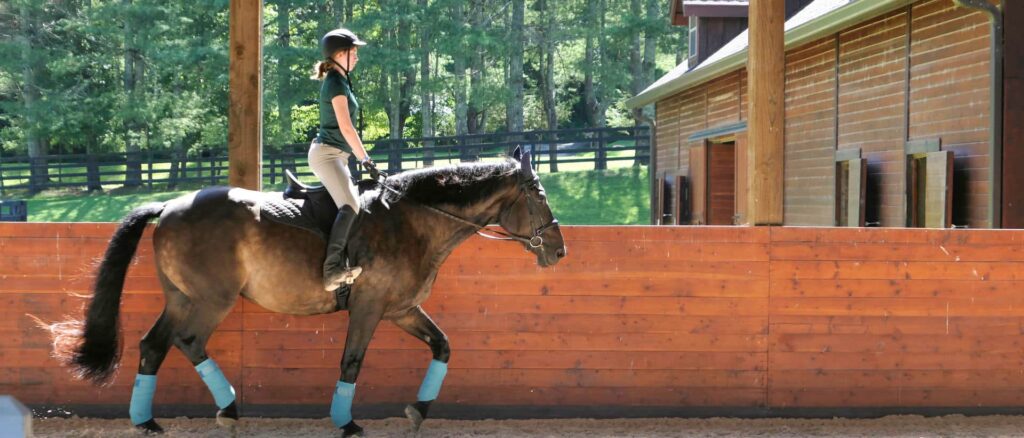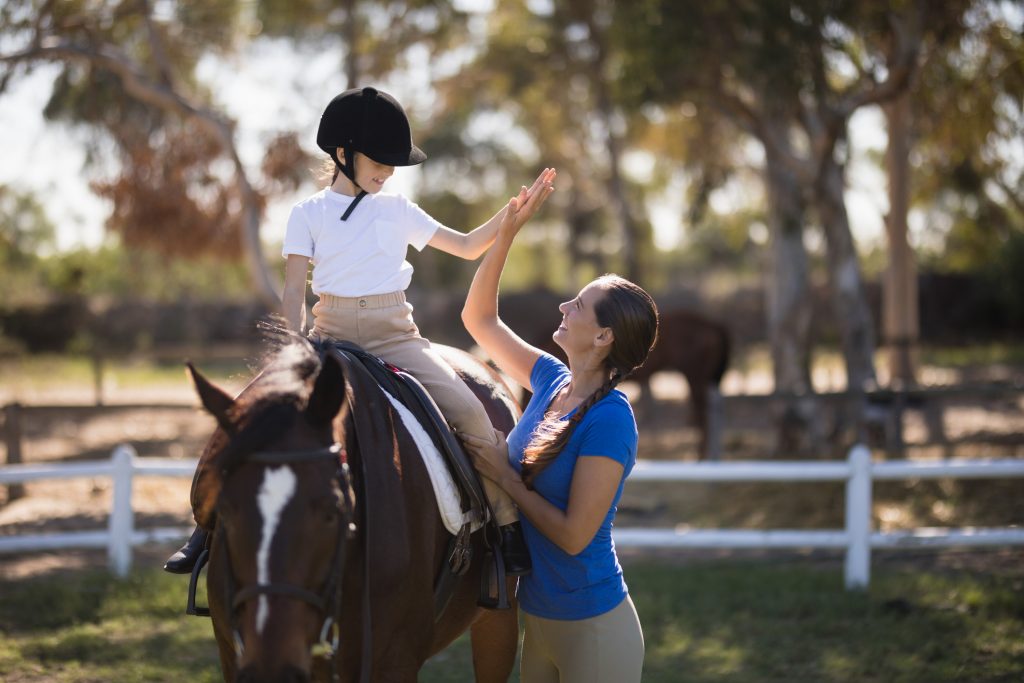Looking to venture into the world of horseback riding camps? Look no further! This article explores different horseback riding camps and what they have to offer. From day camps to overnight camps, there are options for everyone. Learn about the activities, accommodations, and the overall experience at each camp. So saddle up and get ready to embark on an unforgettable horseback riding adventure!
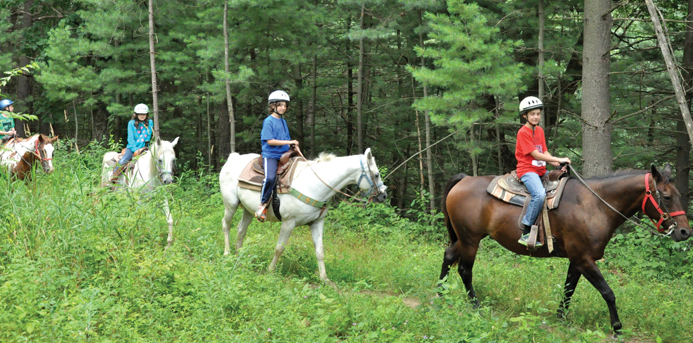
Different Types of Horseback Riding Camps
Horseback riding camps offer a wonderful opportunity for individuals of all ages to immerse themselves in the equestrian world, gain valuable riding skills, and forge meaningful connections with horses. There are various types of horseback riding camps available, each catering to different disciplines, experience levels, and preferences.
Traditional Riding Camps
Traditional riding camps provide a well-rounded experience for riders by focusing on various aspects of horsemanship. Participants will engage in riding lessons, horse care and grooming, and horse health and first aid education. These camps are perfect for those who want to develop a solid foundation in horseback riding and equestrian knowledge.
Western Riding Camps
For those with a passion for all things western, western riding camps offer an immersive experience in western-style riding. Participants will learn techniques such as reining, barrel racing, and trail riding, while also gaining a deeper understanding of western horsemanship traditions.
English Riding Camps
English riding camps are tailored for individuals interested in disciplines such as dressage, jumping, and eventing. Participants will refine their riding skills and learn the finer points of equitation, as well as gaining experience in horse care specific to English riding.
Trail Riding Camps
Trail riding camps provide the perfect opportunity for riders to explore scenic trails and enjoy the beauty of nature from horseback. Participants will learn trail safety, navigation skills, and how to care for their horses during long rides. It’s an ideal choice for those who want to embark on unforgettable riding adventures.
Dressage Camps
Dressage camps focus specifically on the discipline of dressage, which emphasizes the harmony and communication between horse and rider. Participants will receive intensive training in dressage techniques, test riding, and dressage theory, allowing them to refine their skills and enhance their understanding of the art.
Jumping Camps
Jumping camps are designed for riders who want to focus on show jumping and develop their jumping technique. Participants will receive instruction in correct jumping position, course riding, and stride adjustment, helping them to excel in this thrilling and competitive discipline.
Vaulting Camps
Vaulting camps combine the art of gymnastics with horseback riding, providing a unique and exciting experience. Participants will learn various gymnastic exercises and perform choreographed routines on the back of a moving horse, enhancing their balance, strength, and coordination.
Polo Camps
For those intrigued by the fast-paced sport of polo, polo camps offer the chance to learn the ins and outs of this exhilarating game. Participants will receive polo instruction, practice polo skills such as hitting, riding off, and hooking, and even have the opportunity to engage in friendly polo matches.
Therapeutic Riding Camps
Therapeutic riding camps cater to individuals with disabilities, offering a safe and supportive environment for them to enjoy the benefits of horseback riding. Participants will engage in adapted riding lessons and activities specifically designed to address individual therapeutic needs, promoting physical, emotional, and cognitive development.
Working Ranch Camps
Working ranch camps provide an immersive experience in the world of ranching, where participants take on the role of cowboys and cowgirls. They will assist in daily ranch tasks such as herding and sorting cattle, trail riding, and learning basic ranch management skills, offering a taste of the true western lifestyle.
Location
When choosing a horseback riding camp, considering the location is crucial as it can greatly impact the overall experience. There are various options to consider in terms of camp location.
Local Camps
Local camps are a convenient choice for individuals who prefer to stay close to home or have limited time available. These camps are typically within a reasonable driving distance, making them easily accessible and ideal for day camps or shorter duration programs.
National Camps
National camps are spread across different states within the country and often attract participants from a wider geographical area. These camps offer a greater variety of facilities and riding opportunities, providing a more immersive experience for participants.
International Camps
For those seeking a truly unique horseback riding experience, international camps offer the chance to explore different countries and cultures while honing their equestrian skills. These camps provide an opportunity to ride in diverse landscapes and learn from internationally renowned instructors, offering a truly unforgettable adventure.
Duration of Camps
Horseback riding camps vary greatly in duration, allowing participants to choose a program that suits their availability and desired level of immersion.
Day Camps
Day camps provide a shorter camp experience, with participants attending riding lessons and activities during the day and returning home in the evening. These camps are perfect for individuals who want to experience the joy of horseback riding without having to stay overnight.
Weekend Camps
Weekend camps allow participants to extend their equestrian experience over a couple of days. These camps typically start on Friday evening and end on Sunday afternoon, providing a more immersive experience than day camps while still accommodating those with busy schedules.
Week-long Camps
Week-long camps are a popular choice for many riders, offering a more comprehensive and intensive experience. Participants stay at the camp from Monday to Friday and engage in a range of activities, including riding lessons, trail rides, and educational sessions.
Summer Camps
Summer camps are a favorite among equestrians, as they provide an extended opportunity to immerse oneself in the world of horseback riding and develop valuable skills. These camps usually span one to two weeks, allowing participants to form lasting friendships and create lasting memories.
Year-round Camps
For individuals who wish to pursue horseback riding on a more long-term basis, year-round camps are the ideal choice. These camps offer continuous training and riding opportunities throughout the year, providing a consistent equestrian education for dedicated riders.
Age Group
Horseback riding camps cater to individuals of various age groups, ensuring that everyone can find a program suited to their stage of life and riding goals.
Kids Camps
Kids camps are specifically designed for young riders, usually between the ages of 6 and 12. These camps offer a safe and supportive environment for children to learn riding skills, develop confidence, and create a lifelong love for horses.
Teen Camps
Teen camps are tailored for adolescents and teenagers, typically ranging from ages 13 to 18. These camps provide more advanced riding instruction and offer opportunities for teens to expand their knowledge of the equestrian world, fostering independence and personal growth.
Adult Camps
Adult camps offer a fulfilling experience for riders who have always dreamed of honing their equestrian skills or rekindling their love for horseback riding. These camps cater to participants over the age of 18 and provide specialized instruction and activities tailored to the needs of adult riders.
Family Camps
Family camps allow riders of all ages to come together and enjoy a horseback riding experience as a family. These camps provide activities and instruction suitable for each member of the family, encouraging bonding and creating lasting memories.
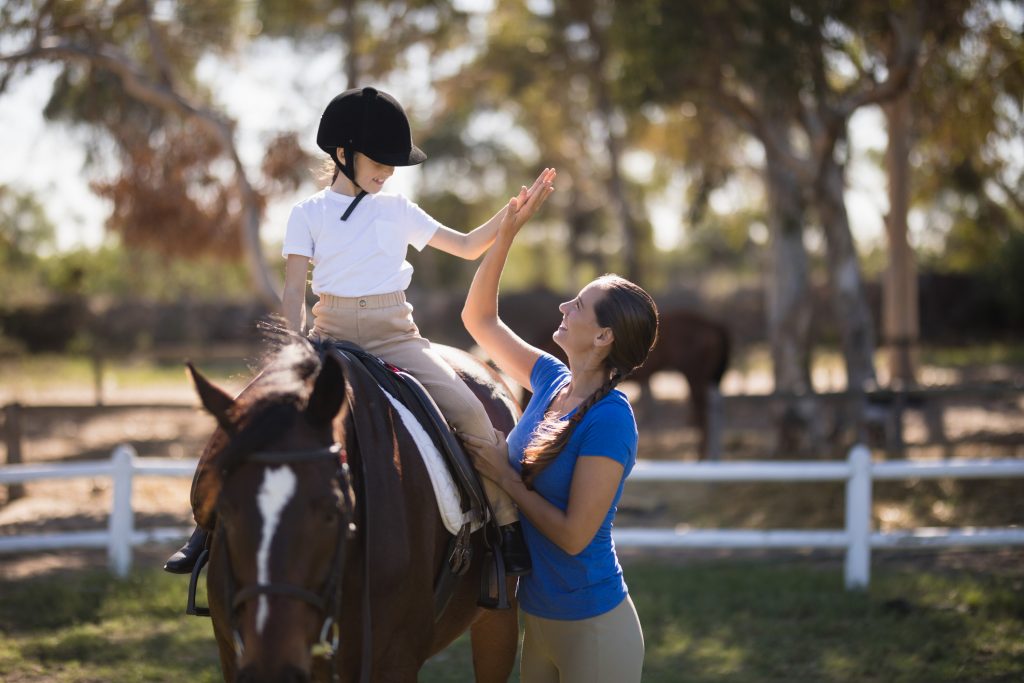
Camp Size
When selecting a horseback riding camp, considering the size of the camp can greatly impact the overall experience. Camp size can influence the level of personal attention received and the social dynamics within the camp community.
Large Camps
Large camps accommodate a significant number of participants, often hosting hundreds of riders at a time. These camps provide a bustling and energetic atmosphere, with opportunities to meet and interact with a diverse group of riders. Large camps often have a wide range of facilities and amenities, offering a varied and comprehensive program.
Small Camps
Small camps offer a more intimate and personalized experience, catering to a smaller number of participants. These camps provide a close-knit community where riders have the opportunity to form strong bonds with fellow participants and receive individualized attention from instructors.
Private Camps
Private camps offer an exclusive and tailored experience for riders who prefer a more personalized approach. These camps often have limited availability and provide a highly customized program designed to meet the specific goals and preferences of each participant.
Camp Facilities
The facilities available at a horseback riding camp can greatly enhance the overall experience. Here are some common facilities to consider when choosing a camp.
On-site Stables
On-site stables provide the convenience of having horses readily available for riding lessons and activities. These stables often have well-maintained stalls and facilities for proper horse care and management.
Indoor Riding Arenas
Indoor riding arenas offer a covered space for horseback riding activities, allowing riders to continue their training regardless of weather conditions. These arenas provide a controlled environment where lessons and practice sessions can take place comfortably.
Outdoor Riding Arenas
Outdoor riding arenas are essential for riders to practice and refine their skills in an open-air environment. These arenas are typically equipped with proper footing and jumping equipment, enabling riders to engage in various riding disciplines.
Paddocks and Pastures
Paddocks and pastures provide ample turnout areas for horses, allowing them to graze and socialize when not in use for riding activities. These areas contribute to the overall well-being and happiness of horses, ensuring they have access to proper exercise and relaxation.
Cross-Country Course
A cross-country course is a dedicated area where riders can practice the exciting discipline of eventing. These courses feature various natural obstacles, including water jumps, ditches, and banks, offering riders the opportunity to test their skills and challenge themselves.
Equestrian Trails
Equestrian trails are a vital feature for trail riding camps, providing picturesque paths for riders to explore natural landscapes. These trails often meander through forests, fields, and along rivers, offering a rewarding and unforgettable riding experience.
Swimming Pool
Some camps provide a swimming pool as an additional amenity for participants to cool off and relax after a day of horseback riding. Swimming pools offer a fun recreational activity and can also be used for water aerobics or rehabilitation exercises.
Accommodation
Accommodation options vary depending on whether the camp offers overnight stays. Some camps provide cabins or dormitories, while others may offer the option to bring your own tent or campervan. It’s important to consider the comfort and suitability of the accommodation when choosing a camp.
Cafeteria
Camp cafeterias provide meals for participants during their stay. These facilities ensure that riders receive nutritious and balanced meals to fuel their activities and provide a convenient dining option during camp.
Campfire Area
Campfire areas offer a cozy spot for campers to gather in the evenings, telling stories, singing songs, and enjoying the company of fellow riders. These areas contribute to the sense of camaraderie and create unforgettable memories around the warmth of a crackling fire.
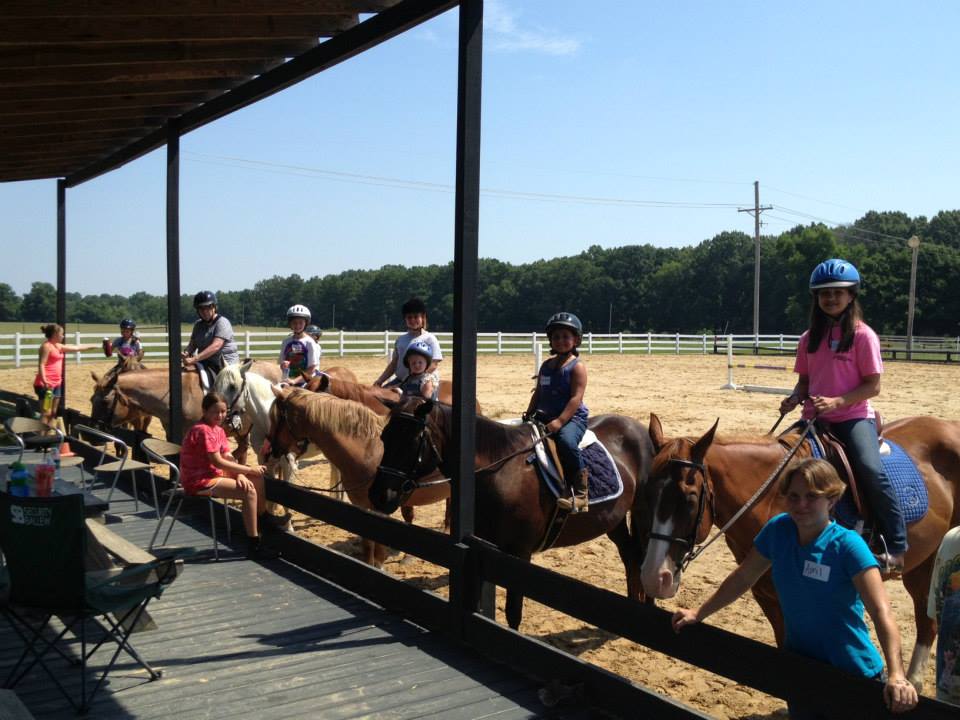
Experience Level
Horseback riding camps cater to individuals of all experience levels, from beginners to advanced riders. Here are the different types of camps based on experience level.
Beginner Camps
Beginner camps are specifically designed for those who are new to horseback riding. These camps focus on building fundamental riding skills, developing confidence, and educating participants about horse care and safety. Beginners will receive patient and attentive instruction to help them develop a solid foundation in riding.
Intermediate Camps
Intermediate camps are ideal for riders who have basic riding skills and are looking to progress to the next level. These camps provide a platform for riders to refine their technique, expand their equestrian knowledge, and explore more complex riding maneuvers.
Advanced Camps
Advanced camps cater to experienced riders who aspire to further develop their skills and take on more challenging equestrian disciplines. These camps offer specialized instruction from top-level trainers, allowing participants to advance their riding abilities and move towards competitive levels.
Mixed Level Camps
Mixed level camps welcome riders of various experience levels, offering a program that can be tailored to each individual’s needs. These camps provide a dynamic atmosphere where participants can learn from each other and receive instruction appropriate for their skill level.
Camp Staff
The staff of a horseback riding camp plays a vital role in ensuring a safe, educational, and enjoyable experience for participants. Here are some key staff members commonly found at camps.
Certified Instructors
Certified instructors possess the necessary qualifications and expertise to provide quality riding instruction. They are trained in teaching riding skills, horse care, and safety. Their role is to guide participants in their equestrian journey and help them achieve their goals.
Experienced Riders
Experienced riders, who are not necessarily instructors, often play an important role at riding camps. They assist in various activities, provide mentorship to less experienced riders, and contribute to the overall camp atmosphere with their knowledge and passion for equestrianism.
Counselors
Counselors are responsible for the well-being and happiness of campers. They ensure that participants are engaged in activities, promote a positive and inclusive camp environment, and provide emotional support when needed. Counselors play an essential role in shaping the overall camp experience.
Veterinarians
Having a veterinarian on-site or readily available is crucial for the health and well-being of the horses. Veterinarians can provide medical care, oversee horse health check-ups, and offer valuable advice on horse care and management.
Farriers
Farriers are professionals trained in the care and maintenance of horses’ hooves. Their role at horseback riding camps is to ensure that the horses’ hooves are properly trimmed and horseshoes are correctly fitted, promoting soundness and preventing hoof-related issues.
Barn Managers
Barn managers oversee the day-to-day operations of the camp’s stable and equestrian facilities. They ensure that the horses’ needs are met, coordinate feeding and turnout schedules, and maintain a clean and organized stable environment.
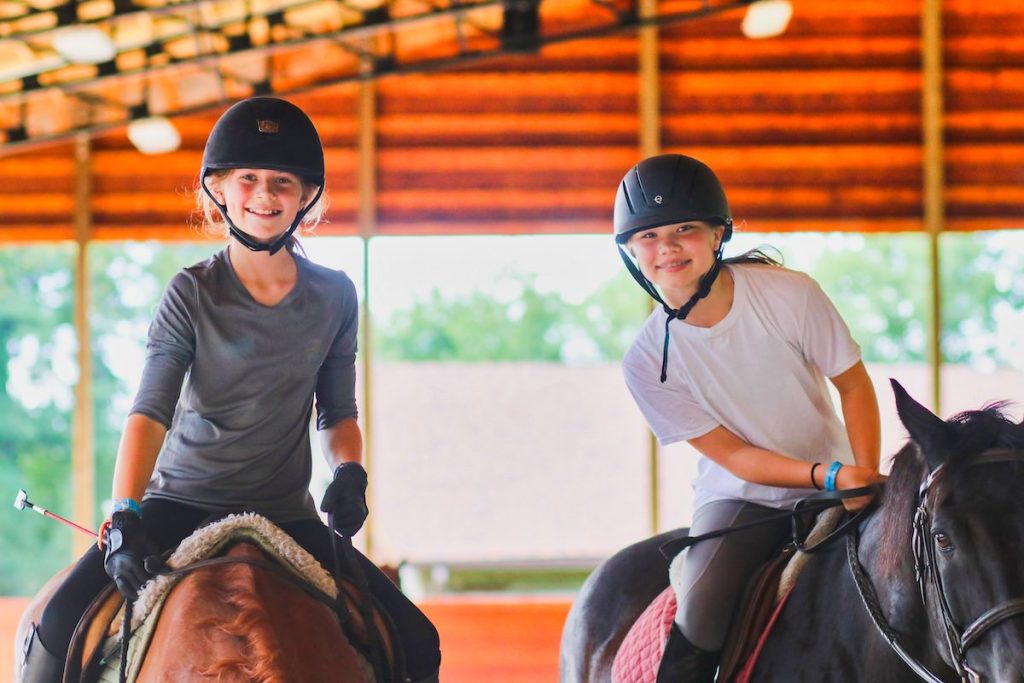
Camp Activities
Horseback riding camps offer a range of activities that go beyond simply riding. These activities contribute to the overall camp experience and help broaden participants’ knowledge and understanding of horses and horsemanship.
Riding Lessons
Riding lessons are the core activity at horseback riding camps. Participants receive instruction tailored to their skill level, enabling them to develop and refine their riding technique. Lessons cover various aspects of riding, including position, balance, and effective communication with the horse.
Trail Rides
Trail rides provide an opportunity for participants to explore scenic trails while enjoying the pleasure of riding. These rides allow riders to experience the beauty of nature on horseback and enhance their horsemanship skills in an outdoor setting.
Horse Care and Grooming
Participants learn essential horse care and grooming techniques, including grooming, tacking, and untacking a horse. They gain an understanding of basic equine anatomy, proper nutrition, and general horse management practices.
Horse Anatomy Education
Horse anatomy education sessions provide participants with a deeper understanding of the structure and function of a horse’s body. These sessions may include demonstrations, diagrams, and interactive activities to enhance participants’ knowledge.
Horse Health and First Aid
Participants learn about common equine ailments, preventive health care practices, and basic first aid measures for horses. This knowledge enables riders to identify signs of illness or injury and take appropriate action when necessary.
Tack and Equipment
Participants learn about different types of horse tack and equipment, their uses, and proper fitting. Understanding proper tack and equipment is crucial for the comfort and safety of both the horse and rider.
Equestrian Games
Equestrian games offer a fun and engaging way for participants to practice riding skills and enhance their horsemanship. Games such as barrel racing, pole bending, and gymkhana help improve coordination, timing, and agility.
Camp Competitions
Camp competitions provide a friendly and supportive environment for participants to showcase their riding skills. These competitions may include elements such as jumping courses, dressage tests, or timed events, fostering healthy competition and a sense of achievement.
Horse Shows and Exhibitions
Horse shows and exhibitions allow participants to demonstrate their riding abilities and receive constructive feedback from judges. These events often involve a range of disciplines, allowing participants to showcase their versatility and refine their performance skills.
Horseback Riding Theory
Horseback riding theory sessions focus on the theoretical aspects of equestrianism. Participants learn about riding principles, training methodologies, and the philosophy behind different riding disciplines. These sessions help riders deepen their understanding of horsemanship and improve their overall performance.
Camp Safety Measures
The safety of participants and horses is of utmost importance at horseback riding camps. Here are some common safety measures implemented to ensure a secure environment.
Safety Equipment
Camps provide participants with appropriate safety equipment, including helmets and protective vests, to minimize the risk of injuries during horseback riding activities. The use of safety equipment is mandatory, and camp staff ensure that each participant is properly equipped.
Supervision and Instruction
Qualified instructors and staff provide close supervision and instruction during all riding activities, ensuring that participants ride in a safe and controlled manner. They guide riders on proper riding technique, enforce safety rules, and are vigilant in addressing any potential hazards.
Emergency Response Plan
Camps have a well-defined emergency response plan in place to handle any accidents or emergencies that may arise. Staff members are trained in first aid, and protocols for managing injuries, contacting emergency services, and evacuating participants are established.
Health Checks for Horses
The camp’s veterinarian conducts regular health checks on the horses to ensure their well-being and detect any potential health issues. This includes vaccinations, deworming, dental checks, hoof care, and general health assessments.
Background Checks for Staff
Camps prioritize the safety and well-being of participants by conducting thorough background checks on all staff members. This helps ensure that the camp employs trustworthy individuals who can provide a safe and nurturing environment for campers.
Safety Guidelines for Campers
Participants are provided with comprehensive safety guidelines that outline proper behavior, safety rules, and measures to minimize risks. These guidelines are clearly communicated and reinforced throughout the camp, promoting a culture of safety awareness and responsibility.
Animal Welfare Policies
Horseback riding camps uphold strict animal welfare policies to ensure the well-being and ethical treatment of horses. These policies address aspects such as horse health and nutrition, living conditions, responsible horse use, and humane handling practices.
By considering the different types of horseback riding camps, locations, durations, age groups, camp sizes, facilities, experience levels, staff, activities, and safety measures, individuals can make an informed decision when choosing a camp that aligns with their interests, goals, and needs. Whether you are a beginner looking to try horseback riding for the first time or an experienced rider seeking to advance your skills in a specific discipline, there is a horseback riding camp out there waiting to provide you with an unforgettable equestrian experience.
